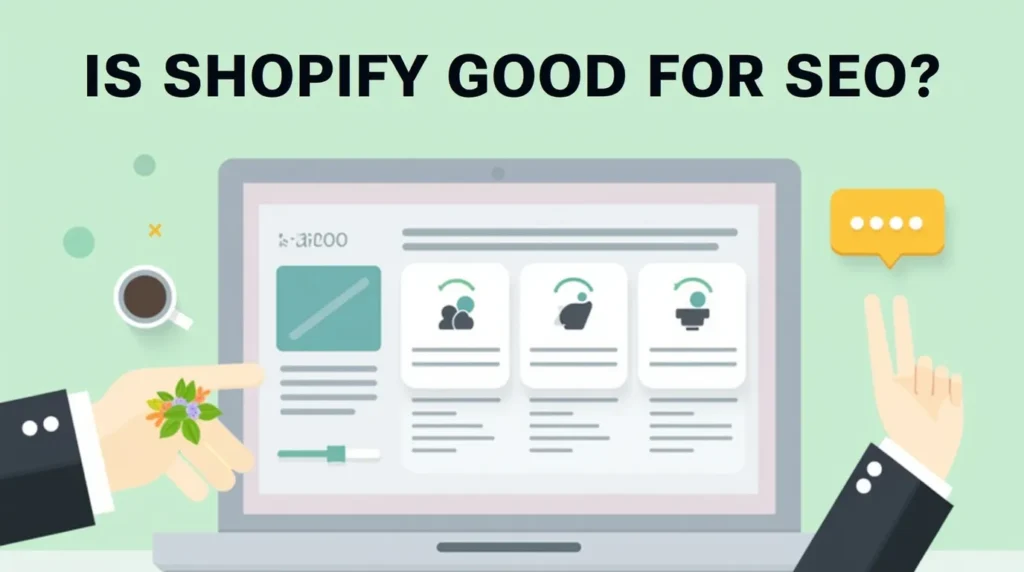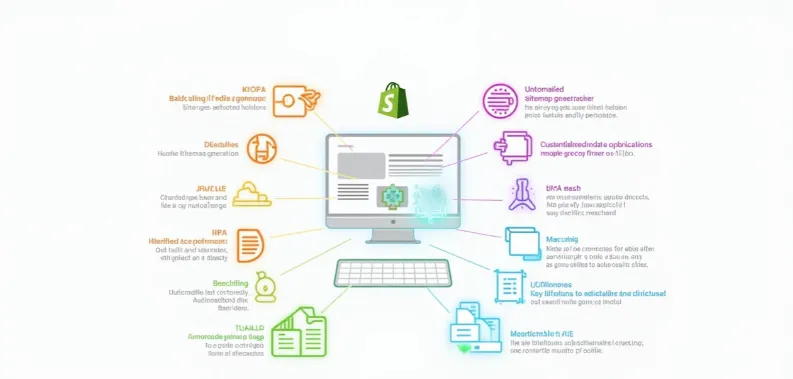
Shopify powers millions of online stores worldwide, making it a top choice for e-commerce businesses. Its user-friendly interface and robust features attract businesses of all sizes. However, many store owners ask whether Shopify is effective for search engine optimization (SEO) in 2025. SEO is critical for driving organic traffic, which can lead to more sales without relying on paid ads.
Shopify’s Built-in SEO Features

Shopify provides several built-in features that simplify SEO, even for those with limited technical expertise. These tools help search engines like Google crawl and index your store effectively.
- Automatic Sitemap Generation: Shopify creates a sitemap automatically, located at /sitemap.xml, which helps search engines understand your site’s structure .
- Editable Meta Tags: You can customize title tags and meta descriptions for products, collections, and blog posts to include relevant keywords.
- URL Customization: While Shopify uses fixed structures like /products/ or /collections/, you can edit URL handles to make them more SEO-friendly.
- Alt Text for Images: Adding descriptive alt text to images improves image SEO and accessibility for screen readers.
- Mobile-Friendly Themes: All Shopify themes are responsive, aligning with Google’s mobile-first indexing, a key ranking factor.
- SSL Certification: Every Shopify store includes an SSL certificate, ensuring secure connections and boosting trust with search engines and customers.
- Structured Data Support: Shopify supports basic schema markup, enabling rich snippets in search results to increase click-through rates.
- Google Analytics and Search Console Integration: Shopify integrates with these tools, allowing you to track performance and identify SEO issues .

Advantages of Using Shopify for SEO
Shopify offers several benefits that make it a strong platform for SEO, particularly for beginners and small to medium-sized businesses.
- Ease of Use: Shopify’s intuitive interface allows users to implement SEO basics without coding knowledge.
- Built-in Tools: Features like automatic sitemaps and canonical tags handle technical SEO, reducing manual effort.
- Regular Updates: Shopify frequently updates its platform to align with search engine algorithms, such as Google’s 2025 focus on user experience .
- App Ecosystem: The Shopify App Store offers tools like Booster SEO and TinyIMG to enhance SEO capabilities .
- Ideal for Smaller Businesses: Shopify’s simplicity makes it suitable for businesses without dedicated SEO teams.
Limitations of Shopify for SEO

While Shopify is SEO-friendly, it has limitations that may affect advanced users or specific strategies.
- Limited URL Control: Fixed structures like /products/ and /collections/ cannot be fully customized, which may complicate migrations or advanced SEO .
- No .htaccess or Server Log Access: Advanced techniques requiring server-level control are unavailable, limiting some optimizations.
- Duplicate Content Risks: Products in multiple collections can create duplicate URLs, though canonical tags help mitigate this .
- Basic Blogging Features: Shopify’s blogging platform lacks advanced features like custom fields or comment sections compared to WordPress .
- Simplistic Structured Data: Basic schema support may require apps or custom code for advanced implementations.
- Complex Subcategories: Creating nested collections often requires coding or apps, which can be challenging for beginners.

Best Practices for SEO on Shopify
To maximize Shopify’s SEO potential, follow these actionable best practices:
- Choose an SEO-Friendly Theme: Select themes like Debut or Brooklyn for clean code and fast loading times.
- Optimize Product and Category Pages: Use targeted keywords in titles, descriptions, and tags. Keep meta descriptions under 160 characters .
- Use High-Quality Images with Alt Text: Compress images with apps like TinyIMG and add descriptive alt text .
- Ensure Fast Loading Speeds: Aim for load times under 3 seconds using image optimization and minimal apps .
- Implement Internal Linking: Link related products, categories, and blog posts to improve navigation and crawlability .
- Leverage Blogging: Create blog posts targeting long-tail keywords to attract informational searches and link to products.
- Use SEO Apps: Apps like Semrush, Booster SEO, or StoreSEO automate tasks like keyword tracking and image optimization .
- Monitor Performance: Use Google Search Console and Analytics to track rankings and fix issues.
Comparing Shopify with Other E-commerce Platforms for SEO
Here’s how Shopify compares to other platforms for SEO:
Shopify balances ease of use and SEO functionality, making it ideal for most small to medium-sized stores.
Case Studies and Examples
Successful Shopify stores demonstrate its SEO potential. Growth Pro increased a client’s organic traffic by 150% in three months using Shopify SEO strategies. The North Face uses Shopify to achieve high Google rankings through optimized product pages and content marketing. These examples show that with proper optimization, Shopify can compete in search results.
Addressing Common Concerns
Here are answers to common Shopify SEO questions:
- Can I rank high on Google with Shopify? Yes, many stores achieve top rankings by optimizing content and using apps .
- Does Shopify support structured data? Yes, it supports basic schema markup, with apps available for advanced setups .
- How does Shopify handle mobile SEO? All themes are mobile-responsive, aligning with Google’s mobile-first indexing.
- Is Shopify suitable for large enterprises? It’s best for small to medium businesses, but enterprises may need more flexibility from platforms like Magento.
Tools and Resources
Enhance your Shopify SEO with these tools:
- Google Search Console: Monitor search performance and fix crawling issues .
- Google Analytics: Track user behavior and conversions.
- Semrush: Conduct keyword research and competitor analysis .
- Booster SEO: Optimize on-page elements and images .
- TinyIMG: Automate image compression and lazy loading .
- Shopify’s SEO Guides: Access resources on the Shopify Help Center .
- Read post about “Essential SEO Tools for Online Stores” on HQLINKERS Blog.
FAQs
- What are the SEO features of Shopify?
Shopify includes automatic sitemaps, editable meta tags, URL customization, alt text, mobile-friendly themes, SSL, structured data, and analytics integration. - Is Shopify good for SEO in 2025?
Yes, Shopify remains SEO-friendly with updates aligning with Google’s focus on user experience. - How does Shopify compare to WooCommerce for SEO?
WooCommerce offers more flexibility but requires technical skills, while Shopify is easier to use . - Can I rank high on Google with Shopify?
Yes, with proper optimization, Shopify stores can achieve top rankings. - What are the best SEO practices for Shopify?
Use SEO-friendly themes, optimize pages, compress images, implement internal links, blog strategically, and use SEO apps. - Does Shopify have built-in SEO tools?
Yes, it includes tools like sitemaps, meta tags, and URL customization. - Is Shopify SEO-friendly?
Yes, its features support effective SEO practices for most stores. - How can I improve my Shopify store’s SEO?
Optimize pages, use keywords, ensure fast load times, and leverage apps.
Final Thoughts
Shopify is a reliable platform for SEO, offering a balance of simplicity and functionality. Its limitations, such as URL restrictions, are outweighed by its ease of use and app ecosystem for most users. By staying updated with SEO trends and applying the strategies outlined, you can ensure your Shopify store thrives in search rankings. Regular monitoring and adaptation are key to long-term success in the competitive e-commerce landscape.

